
Edward Regan Murphy is an American comedian, actor, and singer. He shot to fame on the sketch comedy show Saturday Night Live, for which he was a regular cast member from 1980 to 1984. He is widely recognized as one of the greatest comedians of all time. Murphy has received accolades such as the Golden Globe Award, a Grammy Award, and an Emmy Award as well as nominations for an Academy Award and a BAFTA Award. He was honored with the Mark Twain Prize for American Humor in 2015 and the Cecil B. DeMille Award in 2023.

Mr. Smith Goes to Washington is a 1939 American political comedy-drama film directed by Frank Capra, starring Jean Arthur and James Stewart, and featuring Claude Rains and Edward Arnold. The film is about a naive, newly appointed United States senator who fights against government corruption, and was written by Sidney Buchman, based on Lewis R. Foster's unpublished story "The Gentleman from Montana". The film was controversial when it was first released, but successful at the box office, and it made Stewart a major star. It was also loosely based on the life of Montana U.S. Senator Burton Wheeler, who underwent a similar experience when he was investigating the Warren Harding administration.
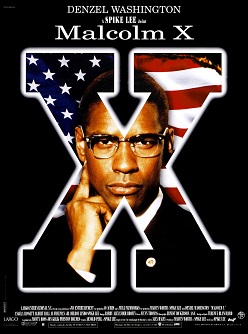
Malcolm X is a 1992 American epic biographical drama film about the African-American activist Malcolm X. Directed and co-written by Spike Lee, the film stars Denzel Washington in the title role, as well as Angela Bassett, Albert Hall, Al Freeman Jr., and Delroy Lindo. Lee has a supporting role, while Black Panther Party co-founder Bobby Seale, the Rev. Al Sharpton, and future South African president Nelson Mandela make cameo appearances. It is the second of four film collaborations between Washington and Lee.

Barry Lee Levinson is an American film director, producer and screenwriter. His best-known works are mid-budget comedy drama and drama films such as Diner (1982), The Natural (1984), Good Morning, Vietnam (1987), Bugsy (1991), and Wag the Dog (1997). Levinson won the Academy Award for Best Director for Rain Man (1988). In 2021, he co-executive produced the Hulu miniseries Dopesick and directed the first two episodes.

Silent Movie is a 1976 American satirical silent comedy film cowritten, directed by and starring Mel Brooks, released by 20th Century Fox in summer 1976. The ensemble cast includes Dom DeLuise, Marty Feldman, Bernadette Peters and Sid Caesar, with cameos by Anne Bancroft, Liza Minnelli, Burt Reynolds, James Caan, Marcel Marceau and Paul Newman as themselves. The film was produced in the manner of a 20th-century silent film, with intertitles instead of spoken dialogue; the soundtrack consists almost entirely of accompanying music and sound effects. It is an affectionate parody of slapstick comedies, including those of Charlie Chaplin, Mack Sennett and Buster Keaton. The film satirizes the film industry, presenting the story of a film producer trying to obtain studio support to make a silent film in the 1970s.
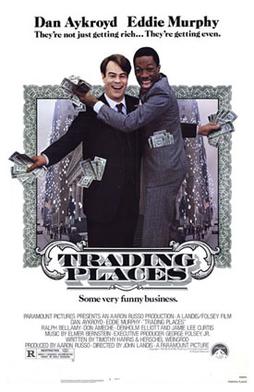
Trading Places is a 1983 American comedy film directed by John Landis, with a screenplay by Timothy Harris and Herschel Weingrod. Starring Dan Aykroyd, Eddie Murphy, Ralph Bellamy, Don Ameche, Denholm Elliott, and Jamie Lee Curtis, the film tells the story of an upper-class commodities broker (Aykroyd) and a poor street hustler (Murphy) whose lives cross when they are unwittingly made the subjects of an elaborate bet to test how each man will perform when their life circumstances are swapped.

Martin Kaplan is an American professor and former studio executive and writer. He teaches at the USC Annenberg School for Communication & Journalism and is the founding director of the Norman Lear Center for the study of the impact of entertainment on society. His career has also spanned government and politics, the entertainment industry and journalism.
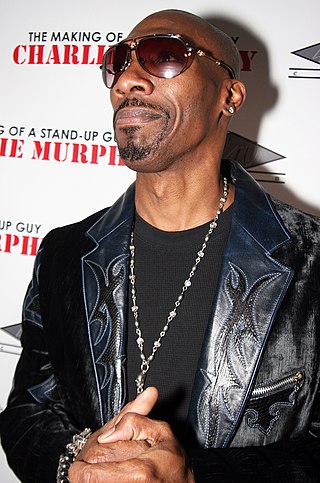
Charles Quinton Murphy was an American comedian, actor, and writer. He was best known as a writer and cast member of the Comedy Central sketch-comedy series Chappelle's Show as well as the co-star of the sitcom Black Jesus. He was the older brother of actor and comedian Eddie Murphy.
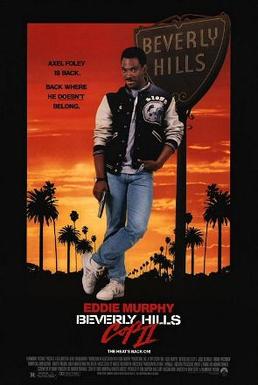
Beverly Hills Cop II is a 1987 American buddy cop action comedy film directed by Tony Scott, written by Larry Ferguson and Warren Skaaren, and starring Eddie Murphy. It is the sequel to the 1984 film Beverly Hills Cop and the second installment in the Beverly Hills Cop film series. Murphy returns as Detroit police detective Axel Foley, who reunites with Beverly Hills detectives Billy Rosewood and John Taggart to stop a criminal organization after Captain Andrew Bogomil is shot and seriously wounded.
Walter Lane Smith III was an American actor. His well-known roles included newspaper editor Perry White in the ABC series Lois & Clark: The New Adventures of Superman, Walter Warner in Son in Law, collaborator entrepreneur Nathan Bates in the NBC television series V, Mayor Bates in the film Red Dawn, Coach Jack Reilly in The Mighty Ducks, district attorney Jim Trotter III in My Cousin Vinny, U.S. Congressman Dick Dodge in The Distinguished Gentleman, Grantland Rice in The Legend of Bagger Vance, and U.S. President Richard Nixon in The Final Days, for which he received a Golden Globe award nomination.
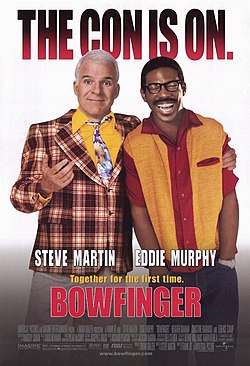
Bowfinger is a 1999 American satirical buddy comedy film directed by Frank Oz. The film depicts a down-and-out filmmaker in Hollywood attempting to make a film on a small budget with a star who does not know that he is in the movie. It was written by Steve Martin, who also stars alongside Eddie Murphy in two roles, and Heather Graham as an ambitious would-be starlet.
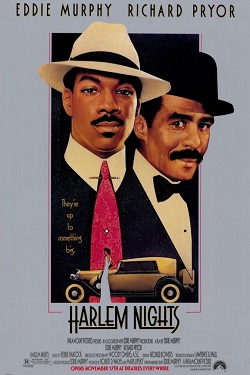
Harlem Nights is a 1989 American crime comedy-drama film starring, written, and directed by Eddie Murphy. The film co-stars Richard Pryor, Redd Foxx, Danny Aiello, Michael Lerner, Della Reese, and Murphy's older brother Charlie. The film was released theatrically on November 17, 1989, by Paramount Pictures. The film tells the story of "Sugar" Ray and Vernest "Quick" Brown as a team running a nightclub in the late 1930s in Harlem while contending with gangsters and corrupt police officials.
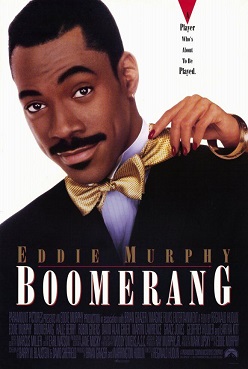
Boomerang is a 1992 American romantic comedy film directed by Reginald Hudlin. The film stars Eddie Murphy as Marcus Graham, a hotshot advertising executive who also happens to be an insatiable womanizer and male chauvinist. When he meets his new boss, Jacqueline Broyer, Marcus discovers that she is essentially a female version of himself, and he realizes he is receiving the same treatment that he delivers to others. The film also features Halle Berry, David Alan Grier, Martin Lawrence, Grace Jones, Eartha Kitt and Chris Rock.
Edward Grant Shaud III is an American actor best known for his portrayal of the character of Miles Silverberg on the television sitcom Murphy Brown. He's also had notable roles in the films The Distinguished Gentleman and Antz, among other voice performances in The Wild Thornberrys, Godzilla: The Series and Batman: The Animated Series.

Joe Regalbuto is an American actor and director. He is known for his role as Frank Fontana on the CBS television sitcom Murphy Brown, which earned him a Primetime Emmy Award nomination in 1989.
Deon Richmond is an American actor from New York City who is best known for his recurring roles as Rudy Huxtable's friend Kenny on the NBC sitcom The Cosby Show and Jordan Bennett on the ABC/The WB sitcom Sister, Sister. He has been nominated for two Young Artist Awards, winning one in 1989.

Disclosure is a 1994 American thriller film directed by Barry Levinson, starring Michael Douglas and Demi Moore. It is based on Michael Crichton's novel of the same name. The cast also includes Donald Sutherland, Caroline Goodall and Dennis Miller. The film is a combination thriller and slight mystery in an office setting within the computer industry in the mid-1990s. The main focus of the story, from which the film and book take their titles, is the issue of sexual harassment and its power structure. The film received mixed reviews from critics but was a box office success grossing $214 million against its $50 million budget.
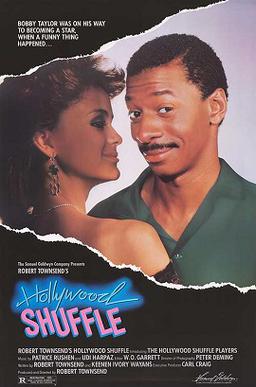
Hollywood Shuffle is a 1987 American satirical comedy film about the racial stereotypes of African Americans in film and television. The film tracks the attempts of Bobby Taylor to become a successful actor and the mental and external roadblocks he encounters, represented through a series of interspersed vignettes and fantasies. Produced, directed, and co-written by Robert Townsend, the film is semi-autobiographical, reflecting Townsend's experiences as a black actor when he was told he was not "black enough" for certain roles.

Unlawful Entry is a 1992 American psychological thriller film directed by Jonathan Kaplan, and starring Kurt Russell, Madeleine Stowe and Ray Liotta.
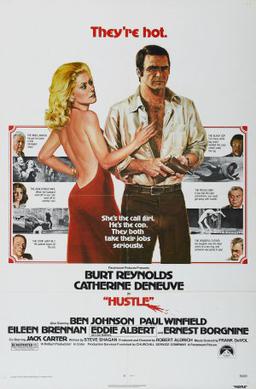
Hustle is a 1975 American neo-noir crime thriller film directed by Robert Aldrich, and starring Burt Reynolds and Catherine Deneuve.

















